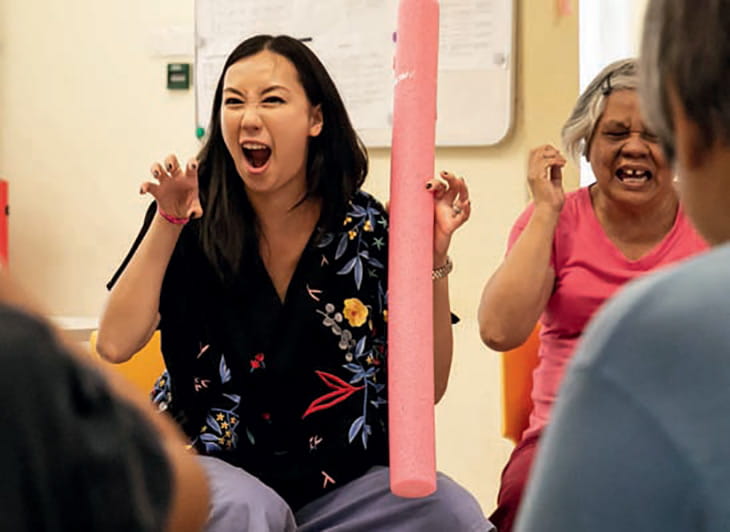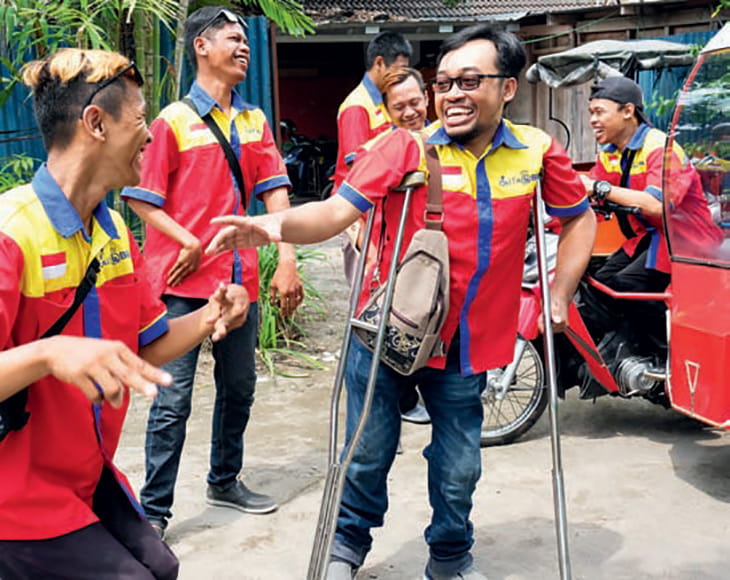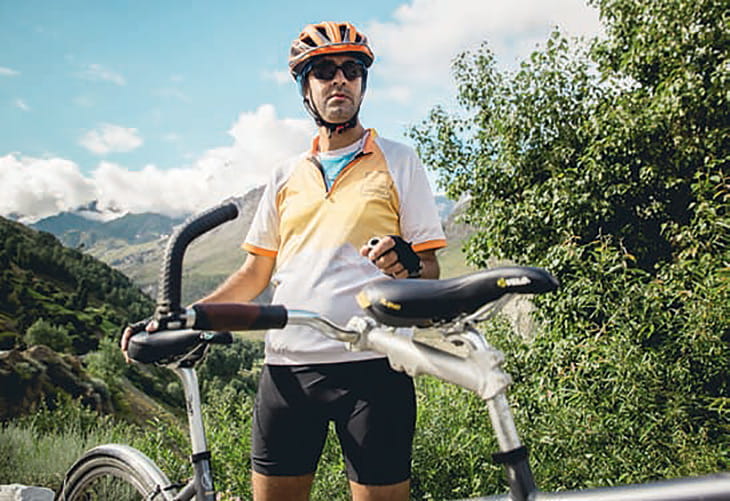Stories > In a Different Sense
In a Different Sense
Our Better World’s very first Virtual Reality series gives the audience an intimate look into the world of people with disabilities.
BY Tan Hwee Hwee
PHOTO Access Path Productions; Difabel; Amrit Vatsa
ll around the world, disabled people face similar challenges – from outright discrimination to misperceptions about what they can achieve.
With a push for greater inclusivity, however, there has also been a growing movement to find ways of enabling the disabled to better participate in society.
In the UK, for instance, a new research project by the University of Leeds aims to harness a diverse range of disciplines – from literature and medical humanities to production engineering and robotics – to determine how technologists can better learn from the disabled and build systems to support them in the future. This also includes an English Studies critical approach that investigates the ways in which disability is represented in literature and film.
Certainly, having people with disability own and tell their stories as active participants – rather than portraying them as passive recipients of aid – is an impactful first step towards greater empowerment.
“In a Different Sense”, an original threestory series produced by the Singapore International Foundation’s digital storytelling platform Our Better World, aims to do just that. Using VR technology, the first-of-itskind series allows viewers to personally experience the world of those living with visible and invisible disabilities.

The accounts reflect the personal stories of three individuals, who have not only refused to solely be defined by their disabilities, but have harnessed the strength that comes from embracing their physical impairment to create positive change for those like themselves.
(IN)VISIBLE SOUND
A hearing-impaired theatre practitioner, Grace Lee-Khoo is the founder of Access Path Productions, a company set up in 2018 to discover and nurture works created by disabled people.
Her story is aimed at giving audiences an intimate experience of what it is like to deal with hearing impairment, in the hope that others could embrace their disability in a more positive way.
“What Is Seen As Crazy In Life Can Become A Creative Expression On Stage.”
Grace Lee-Khoo, Founder, Access Path Productions
“I roped in director James Khoo of Pangolin films, with whom I had previously collaborated on a Singapore-UK international theatre dialogue on disability,” explains Lee-Khoo. “The creative process involved looking at the script and working out how to portray the sounds I hear. What something sounds like to me sounds different to others, and we don’t experience the world in the same way.”
One of the scenes in the video story depicted how at a restaurant with a friend, she was unable to hear her friend seated right in front of her, but had no difficulty catching the tunes of a guitarist further away, with his music and singing seemingly blaring into her ear.
For her, the VR technology used in the video helped to convey the loud noises that were distracting her at the restaurant.
“The 360-degree camera also helped communicate my perspective, to enable the audience to see through my eyes and hear through my ears,” she adds.
As somebody involved in the theatre scene, Lee-Khoo has always been passionate about how the arts can become a creative channel for the disabled. “I know some parents, for example, with Down’s Syndrome children. The child loves singing but the parents try to shut that down, saying: ‘If you sing all the time, people will think you’re crazy.’ But that’s creativity. What is seen as crazy in life can become a creative expression on stage.
“Then there were other parents who saw the OBW video and gave me feedback about how it helped them see the potential of art in helping to channel their children’s seemingly impulsive behaviour.”
One such parent was Kristin van Burn, whose child, Arassi, was born with Down’s Syndrome. “As the mother of an adult daughter with Down’s Syndrome, I could relate to the video. I have often been left misunderstood and frustrated because of Arassi’s difficulty in expressing herself to others. What is clear and straightforward for her is not the case for the general public,” she explains. “With patience, empathy and by providing platforms for expression through alternative means, these frustrations can be mitigated, resulting in a better quality of life for special persons who are all unique in their own ways.”
FROM WHEELCHAIRS TO MOTORBIKES
Yogyakarta-based Triyono, whose bout with polio has made him dependent on crutches, knows first-hand how inaccessible public transportation can be for the disabled in Indonesia. Trying to get up the steps to the elevated bus stop, he has fallen many times, keeled over or slipped on wet ramps.

His story gives viewers an insight into the inconveniences he faces using public transportation as a person with limited physical mobility and how they ultimately spurred him to start the city’s first taxi service for disabled people.
“Everyone Has A Right To Travel Without Limitations, And Difa Is A Way To Help The Disabled By Including Them In Society.”
Triyono, Founder, Difabel
One scene in particular showed passengers on a bus becoming conscious of a disabled person as they watch Triyono board. Other than offering him a seat, however, they appear at a loss for ways to respond to him.
Triyono calls his social enterprise Difa, which is short for “difabel” or “differently abled” in Bahasa Indonesia. He builds customised motorcycles with large side-cars where disabled people can easily be rolled into while in their wheelchairs and sit there for the duration of the journey.
“Everyone has a right to travel without limitations, and Difa is a way to help the disabled by including them in society,” he states. “My disabled customers do not have to fear going out like they used to. Some of them are now leaving their homes for the very first time.
Triyono hopes that his enterprise will not only help those in Yogyakarta but spread all over the world. He has plans to expand Difa to other major cities in Indonesia, and hopes his story can serve as a starting point for the local government to look into improving public transportation.
There is good reason for optimism: The video story has rallied some support for Difa, with viewers donating IDR45,000,000 (S$450) to help it build more vehicles.
AN INCLUSIVE ADVENTURE
A cognitive neuroscientist and disability rights proponent, Divyanshu Ganatra’s passion for the outdoors belies his loss of sight to glaucoma at the age of 19. He has climbed mountains, from the Himalayan peaks to the Sahayadri ranges and Mount Kilimanjaro, over a hundred times.

Having loved adventure sports since childhood, he was determined not to let his disability come in the way of his passion. On the other hand, he has used this as an opportunity to heighten his other senses.
“Now when I go mountain climbing or hiking, I pay more attention to the sounds, smell and tactile textures through my sense of touch,” he says.
Still, he faces a common misperception: that disabled people are unable to take part in adventure sports. For instance, most people are surprised to learn that a blind person is actually capable of piloting an aircraft – something he does with a team that helps him navigate using radio communication with ground control staff.
Realising that such stereotypes not only prevent the disabled from living life to the fullest, but also presented an opportunity to fill a market vacuum, he started Adventures Beyond Barriers Foundation (ABBF) in 2014.The non-profit organisation brings together both the disabled and the able-bodied for adventure sports, such as cycling, trekking and scuba-diving.
“Sports Has The Power To Transform The World, Change Attitudes, Build Empathy, Create Dialogue, And Build A More Inclusive Environment.”
Divyanshu Ganatra, Founder ABBF
In Ganatra’s story, we see the impact a cycling expedition in South India had on the participants.
Ganatra reckons that allowing the ablebodied and the disabled to play together in sports creates a safe environment where they are encouraged to be curious. “That is how you help people get to know one another,” he says.
“Sports has the power to transform the world, change attitudes, build empathy, create dialogue, and build a more inclusive environment.”
Indeed, ABBF’s trips have transformed its disabled participants. “After the adventure, you can see the change in them. They are more confident and happier. They come in saying ‘I can’t’ and go away saying ‘I can’. This transformation translates into everyday life.”
Publishing the video story on OBW has helped ABBF reach out to a larger global audience, with more than 100 people inquiring about its activities through the organisation’s online forms.
Watch the three-story video series that offers a virtual reality experience on www.ourbetterworld.org.
